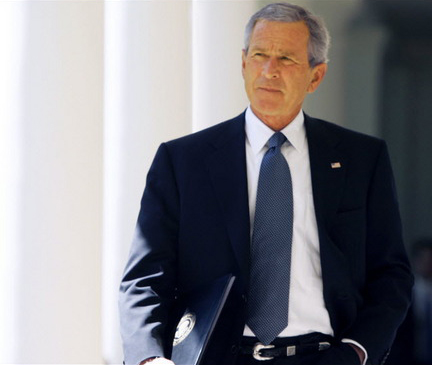In his book Decision Points, former President George W. Bush offers a candid look at his decision-making process while in office. From the war in Iraq to his efforts to reform Social Security, the book is a rare glimpse inside the mind of one of the most controversial presidents of my lifetime. It’s a good read for anybody interested in politics and history, whether you agreed with Bush much or not.
The section in the book dedicated to Hurricane Katrina received a lot of media attention, in part because many people – even five plus years after Katrina – wondered how an administration could be so disengaged at such a critical time. As you might expect, Bush both expressed regrets – he couldn’t deny that the response by federal and state agencies was a disaster – and offered push-back against those who placed blame solely on his administration.
However, there was one explanation of the response that I found especially instructive.
Bush talked about the success he had dealing with natural disasters both as governor of Texas and president; he said he thought his administration had disaster response down. It was a blind spot for him not because he discounted the danger natural disasters posed to America’s coastal cities, but because he had grown complacent and believed past success dealing with disasters would translate into an effective response to Hurricane Katrina. We all know it didn’t.
The lessons of Bush’s failures in New Orleans can be applied to crisis communications. The old maxim “past performance is no guarantee of future success” applies here. Every new crisis/situation has to be analyzed on its own merits and not through the prism of previous events. History and context are important, but they’re no substitute for fresh, current analysis. When consulting with clients like Ready Georgia on crisis communications issues, I and colleagues at my agency always keep these principles in mind.

 As design director at Cookerly, Tim serves as the creative lead in the development of branding campaigns, print collateral and digital media for clients across a broad range of industries, including consumer, professional services, healthcare and technology.
As design director at Cookerly, Tim serves as the creative lead in the development of branding campaigns, print collateral and digital media for clients across a broad range of industries, including consumer, professional services, healthcare and technology. As a senior vice president at Cookerly, Mike Rieman is a strategic communications leader specializing in media relations and reputation management. With a proven track record of securing high-profile placements in top-tier outlets such as The New York Times, The Wall Street Journal, CNN and USA Today, he excels at crafting compelling narratives that resonate across print, broadcast and digital platforms.
As a senior vice president at Cookerly, Mike Rieman is a strategic communications leader specializing in media relations and reputation management. With a proven track record of securing high-profile placements in top-tier outlets such as The New York Times, The Wall Street Journal, CNN and USA Today, he excels at crafting compelling narratives that resonate across print, broadcast and digital platforms. Mike Touhill is vice president at Cookerly Public Relations, where he helps lead traditional, social and digital media programs for B2B and B2C clients in packaging, telecommunications and technology, among other industries. As a communication leader, he develops and executes public relations strategy, provides proactive and reactive counsel to C-level executives and secures earned media coverage for client initiatives and product.
Mike Touhill is vice president at Cookerly Public Relations, where he helps lead traditional, social and digital media programs for B2B and B2C clients in packaging, telecommunications and technology, among other industries. As a communication leader, he develops and executes public relations strategy, provides proactive and reactive counsel to C-level executives and secures earned media coverage for client initiatives and product. Andrew Agan is a vice president at Cookerly Public Relations, overseeing the agency’s internship program and leading media relations, content strategy and social media initiatives. He provides counsel and executes campaigns for clients across various sectors, including finance, healthcare, hospitality, technology, automotive and many others. Andrew excels at crafting compelling stories and building media relationships, resulting in clients being featured in notable outlets such as CNBC, Associated Press, Business Insider, Fox Business, HBO, Inc. Magazine, Sirius XM, The Wall Street Journal and USA Today, among others.
Andrew Agan is a vice president at Cookerly Public Relations, overseeing the agency’s internship program and leading media relations, content strategy and social media initiatives. He provides counsel and executes campaigns for clients across various sectors, including finance, healthcare, hospitality, technology, automotive and many others. Andrew excels at crafting compelling stories and building media relationships, resulting in clients being featured in notable outlets such as CNBC, Associated Press, Business Insider, Fox Business, HBO, Inc. Magazine, Sirius XM, The Wall Street Journal and USA Today, among others.


 As vice president of Cookerly, Sheryl Sellaway uses her extensive corporate communications background to lead consumer PR efforts, deliver strategy for marketing programs and share expertise about community initiatives.
As vice president of Cookerly, Sheryl Sellaway uses her extensive corporate communications background to lead consumer PR efforts, deliver strategy for marketing programs and share expertise about community initiatives.